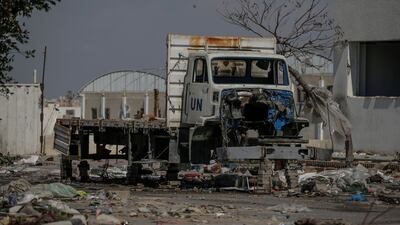Live updates: Follow the latest on Israel-Gaza
Aid workers in Gaza are having to deal with looting and armed militias on the road because Israel has left a “security vacuum”, a top UN official said on Friday.
Fear for their own safety has been heightened by Israel's killing of seven World Central Kitchen workers, said UN aid co-ordinator Jamie McGoldrick.
After a recent visit to Gaza, he said UN staff's relations with Israeli troops were marked by “mistrust and misunderstanding”.
Staff are operating without radios or mobile networks because Israel claims the necessary technology might benefit Hamas, he said.
“We are working in a very hostile area as humanitarians,” said Mr McGoldrick, who is ending an interim three-month term in the UN post.
Israel has traded blame with the UN for what aid groups say is a desperate lack of supplies that risks causing famine in wartime Gaza.
Under pressure from the US, Israel has made some concessions, such as agreeing to use the port of Ashdod as an aid route.
It says the number of lorries entering Gaza is rising and should rise the pre-war level of 500 a day – saying it is up to the UN to distribute aid.

But Mr McGoldrick called Israel's figures questionable and said it must do more than let lorries through crossings such as Kerem Shalom in southern Israel, on the border between Israel, the Gaza Strip and Egypt.
“Israel believes that their responsibility ends when they deliver lorries from Kerem Shalom into the Palestinian side,” Mr McGoldrick said.
“I would say that that’s certainly not the case. Their responsibility ends when aid reaches the civilians in Gaza.”
He said this should involve Israel providing security on the move due to the absence of Palestinian “blue police”.
Guns on the road
Ransacking and looting of lorries is a “common occurrence” and aid workers have encountered shadowy groups armed with pistols and AK-47 rifles, he said.
A mission to the north of Gaza on Friday was cancelled because of insecurity.
“At the moment we don’t have security. The blue policemen that were there before are no longer able to do the job of securing convoys, crowd control,” Mr McGoldrick said.
“We face real law and order problems. There’s a security vacuum there that’s being filled by various groups. Some of them, we don’t know who they are.”
Gaza's north-south roads are in poor condition and unexploded ordnance in areas left behind by Israeli troops pose a further threat, said Mr McGoldrick.
This will be a “real challenge” for civilians trying to return home or leave the city of Rafah before an expected Israeli attack, he said.
“Secondly, it will make our challenges of supplying material into those areas difficult because of the threat to that. So we would have to start looking at that in a different way,” added the UN official.
Diplomats have accused Israel of blocking lorries at the border and imposing overly restrictive rules and checks. Aid agency UNRWA said more than 400 food lorries were denied entry or impeded in March.
Israel says there is “no limit” on the amount of aid that can enter Gaza. It denies allegations it is deliberately causing hunger there.
The Israeli military admitted it was responsible for killing the World Central Kitchen workers in a missile strike, saying it was a case of mistaken identity.
UN staff cannot speak directly to Israeli forces and lack the equipment needed to communicate in an emergency, Mr McGoldrick said.
He said problems with soldier behaviour and “weapons discipline” had been discussed with the head of Israel's southern command, Maj Gen Yaron Finkelstein.
Israel has promised a new co-ordination system as UN workers try to avoid being caught up in gunfire, Mr McGoldrick said.
“We need to be speaking with people who are firing guns, who control weaponry,” he said. “We have to have a hotline.”


